Other books in the How to Start series:
How to Start a Home-Based Business
How to Start a Home-Based Antiques Business
How to Start a Home-Based Carpentry Business
How to Start a Home-Based Catering Business
How to Start a Home-Based Childrens Birthday Party Business
How to Start a Home-Based Consulting Business
How to Start a Home-Based Craft Business
How to Start a Home-Based Day Care Business
How to Start a Home-Based Desktop Publishing Business
How to Start a Home-Based Event Planning Business
How to Start a Home-Based Gift Basket Business
How to Start a Home-Based Handyman Business
How to Start a Home-Based Housecleaning Business
How to Start a Home-Based Interior Design Business
How to Start a Home-Based Jewelry Making Business
How to Start a Home-Based Landscaping Business
How to Start a Home-Based Mail Order Business
How to Start a Home-Based Online Retail Business
How to Start a Home-Based Personal Chef Business
How to Start a Home-Based Personal Trainer Business
How to Start a Home-Based Pet Care Business
How to Start a Home-Based Photography Business
How to Start a Home-Based Professional Organizing Business
How to Start a Home-Based Resume Business
How to Start a Home-Based Secretarial Services Business
How to Start a Home-Based Tutoring Business
How to Start a Home-Based Web Design Business
How to Start a Home-Based Wedding Planning Business
How to Start a Home-Based Writing Business
Published by Taylor Trade Publishing An imprint of The Rowman & Littlefield Publishing Group, Inc. 4501 Forbes Boulevard, Suite 200, Lanham, Maryland 20706 www.rowman.com
Unit A, Whitacre Mews, 26-34 Stannary Street, London SE11 4AB, United Kingdom
Distributed by NATIONAL BOOK NETWORK
Copyright 2010 by Morris Book Publishing Company, LLC. Revised text copyright Taylor Trade Publishing 2015.
All rights reserved. No part of this book may be reproduced in any form or by any electronic or mechanical means, including information storage and retrieval systems, without written permission from the publisher, except by a reviewer who may quote passages in a review.
British Library Cataloguing in Publication Information Available
Library of Congress Cataloging-in-Publication Data
Ferry, James (James L.)
How to start a home-based senior care business / James L. Ferry. Second edition.
pages cm. (How to start series)
Includes index.
ISBN 978-1-4930-0767-7 (pbk. : alk. paper) ISBN 978-1-63076-111-0 (electronic)
1. Older peopleServices for. 2. Older peopleCare. 3. Home-based family services. 4. Home-based businessesManagement. 5. Small businessManagement. I. Title.
HV1451.F47 2015
362.630681dc23
2014046662
 The paper used in this publication meets the minimum requirements of American National Standard for Information SciencesPermanence of Paper for Printed Library Materials, ANSI/NISO Z39.48-1992.
The paper used in this publication meets the minimum requirements of American National Standard for Information SciencesPermanence of Paper for Printed Library Materials, ANSI/NISO Z39.48-1992.
Printed in the United States of America
I would like to dedicate this book to my youngest brother, Brendan John Ferry, who was a careful thinker, gifted musician, and caring person.
You, who left us too soon, and I miss you cronam th.
Contents
Acknowledgments
I would first like to thank my professional colleagues in social work, health care, and geriatric care management. Much of what I know about professional human service and business is the result of what we have talked about and experienced together.
But most important, I would like to acknowledge the support that I am continuously granted from my wife, Dr. Margaret Anne Ferry, loving wife, nurturing mother, and inspiring physician.
Introduction
Since completing the first edition of How to Start a Home-Based Senior Care Business the Affordable Care Act (ACA) was enacted in 2010 and implemented in 2014. Many critics of the ACA feared that this new law would ultimately result in the Federal Government taking over most aspects of health care delivery in the United States. It however continues to be my expectation that many health care consumers, including elderly consumers, will seek the more personalized products and services that a large scale approach to health care provision will ultimately miss. Thus, I continue to feel strongly that many of the finest and most innovative aspects of health care delivery in America will be offered by entrepreneurs, many of whom will start out on a small scale including being home-based.
Successful senior care entrepreneurs tend to be caring, imaginative people from an eclectic array of professional backgrounds. They are simultaneously able to understand the needs of seniors and then create products and services that serve as solutions to problems that are commonly experienced by older and disabled adults and/or their caregivers. Aspiring senior care entrepreneurs should expect that there will be a considerable amount of learning involved along the way. Some of these entrepreneurs come from professional backgrounds in health or human services and thus encounter a steep learning curve related to business planning, development, and marketing. Others are from business backgrounds and have to initially understand the lives and needs of seniors and the senior care marketplace before devising a successful senior care business model.
Successful senior care entrepreneurs need to possess and convey an attitude of caring while also being serious and responsible about business. In my frequent conversations with professionals and entrepreneurs in the field of aging, I find there is a consensus that some level of personal experience with caregiving as well as some amount of years of adult life experience seems to foster an empathy for the challenges faced by frail elders and their caregivers and acuity for products and services that might serve as helpful solutions.
Senior care is not an area for opportunistic serial entrepreneurs who have no interest in the field of aging. A lack of genuine interest in the elderly population will likely be perceived by people in the marketplace and will prevent success. In my professional experience I have occasionally encountered disingenuous or overly opportunistic senior care entrepreneurs. Examples are senior care business owners who do not convey a sense that they care about elders or even make comments in jest about elders. Additionally, there are senior care business people that very obviously place their need for profit over what is in the best interest of their elderly client or customer. Needless to say, this is very troubling behavior given the vulnerabilities experienced by many frail elders. Wrong decisions, bad advice, and inadequate products or services can be a matter of life and death for people who are experiencing medical challenges.
Aspiring senior care entrepreneurs who have always been an employee in a health or human service organization sector will need to learn as much as they can about the realities of owning their own businesses before quitting their day jobs. I would additionally advise any aspiring senior care entrepreneur to proceed with caution with regards to franchise opportunities in the senior care field. With regards to senior care business franchises it is my contention that the training, branding, and setup assistance that might come from purchasing a franchise license for a senior care business might not suffice with the level of clinical knowledge and business acumen necessary for a successful senior care business. My experience and the experience of many of my colleagues is that successful senior care businesses are often the result of an entrepreneur pursuing a passion for helping older adults and their caregivers and doing over time what it takes to build a successful business including financial bootstrapping. A long time ago an experienced entrepreneur advised me that being in business for yourself means you work a lot more and earn a lot more. This advice has turned out to be true for me.

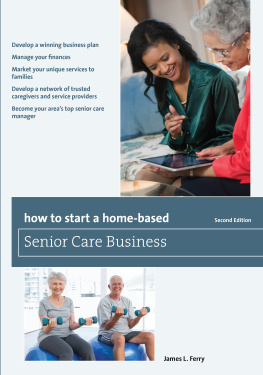

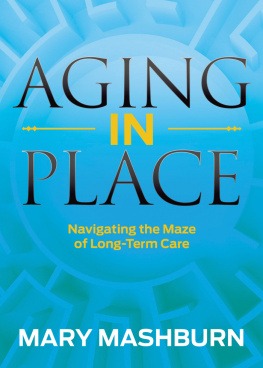


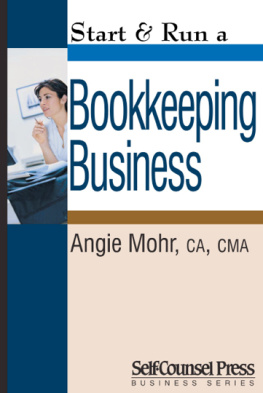
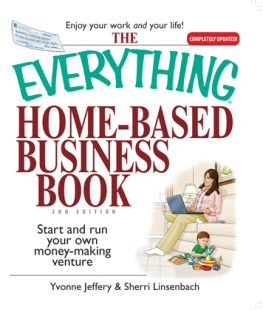



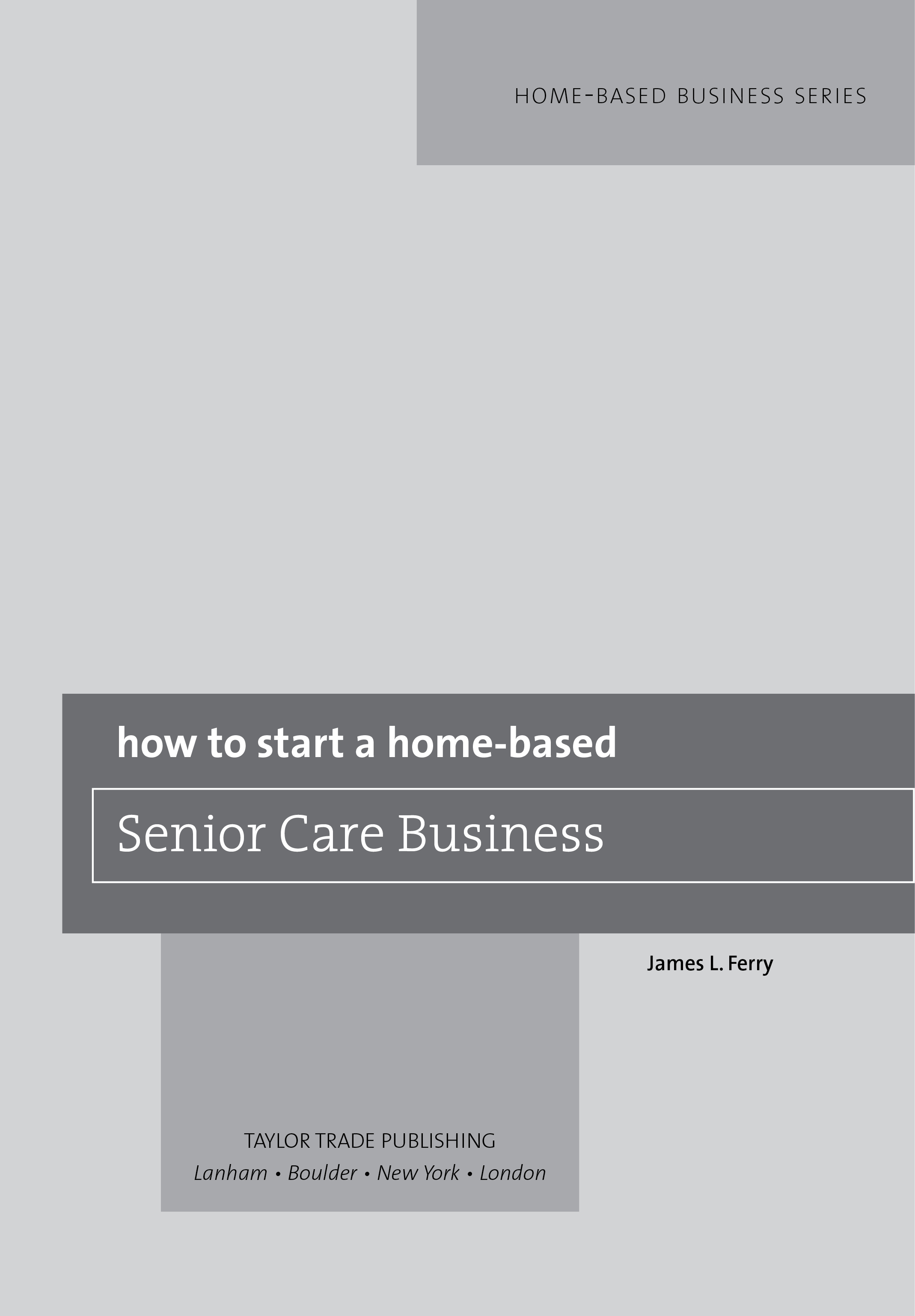
 The paper used in this publication meets the minimum requirements of American National Standard for Information SciencesPermanence of Paper for Printed Library Materials, ANSI/NISO Z39.48-1992.
The paper used in this publication meets the minimum requirements of American National Standard for Information SciencesPermanence of Paper for Printed Library Materials, ANSI/NISO Z39.48-1992.